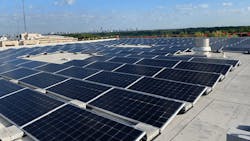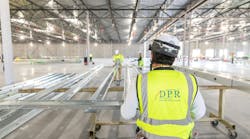SolarBank Breaks Into Data Center Market as Strategic Collaborator, Campus Developer
As North American demand for AI capacity continues to boom, it also continues to bring the energy and data center sectors together, while attracting new players.
One huge, very recent proof of this trend came at the tail end of last month, with the news that global investment firm KKR -- a stalwart in data centers who counts wholesale operator CyrusOne and liquid cooling pioneer CoolIT Systems as just two of its portfolio companies -- has forged a $50 billion strategic collaboration with Energy Capital Partners (ECP), the better to support AI technology expansion through investments in data centers and power generation projects.
Since its founding in 2005, ECP has owned, controlled, and operated over 83 gigawatts (GW) of power generation across all major U.S. power markets, spanning a variety of technologies including natural gas, geothermal, hydro, solar, wind, battery storage, and waste-to-energy.
Now, eyeing the same nexus of advanced technology and business, renewable energy specialist SolarBank Corporation says it plans to expand into the digital infrastructure space as a developer, owner and strategic partner for data center campuses.
Established in 2013, the Toronto-based company builds scale projects as well as smaller community solar platforms, with more than 100 MWs built and a development pipeline of 1 GW.
Specifically, SolarBank develops solar, battery energy storage system (BESS) and EV charging projects that sell electricity to utilities, commercial, industrial, municipal and residential off-takers.
The company notes it maximizes returns via a diverse portfolio of projects across multiple leading North America markets, including projects with utilities, host off-takers, community solar installations, and virtual net metering projects.
Why Data Centers?
SolarBank says its foray into the data center sector underscores its dedication to integrating renewable energy into diverse and emerging markets. The company is an independent renewable and clean energy project developer and owner focusing on distributed and community solar projects in Canada and the US.
Explaining its impetus to move toward digital infrastructure, SolarBank notes that the global data center market, widely projected to reach $395 billion by 2030, has been undergoing exponential growth driven by apparently bottomless demand for cloud computing, artificial intelligence (AI), big data analytics, and nodes on the internet of things (IoT).
As we all know, the data center industry's vast and complex energy requirements underscore an urgent need for scalable, eco-friendly power generation -- a need that SolarBank feels uniquely positioned to fulfill with its expertise in renewable energy.
"Expanding into the data center business aligns with our vision of creating a resilient and sustainable energy grid," said Richard Lu, CEO of SolarBank.
As part of its commitment to sustainable energy, SolarBank says it ultimately aims to reduce the overall carbon footprint of data infrastructure, advancing both corporate goals and broader environmental impact.
The company said its market expansion into data centers reflects its strategic vision to foster innovation and support a sustainable future through clean energy integration.
"Our experience in renewable energy will enable us to deliver energy-efficient, carbon-reducing data centers to support today's data needs and tomorrow's technological advancements," noted SolarBank CEO Lu.
He added, "As the world accelerates toward a future driven by AI, automation, and clean energy, SolarBank remains committed to delivering innovative, scalable solutions that not only power industries but also empower communities."
While the company is expanding into the data center industry, SolarBank notes it does not currently have any data center projects under development or to which it has secured rights.
However, the company's press release from this month aspirationally names several data center firms it may envision as partners.
About the Author
Matt Vincent
A B2B technology journalist and editor with more than two decades of experience, Matt Vincent is Editor in Chief of Data Center Frontier.



